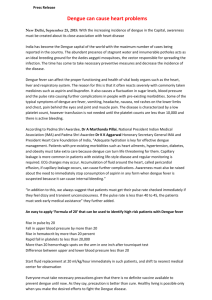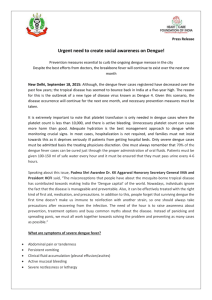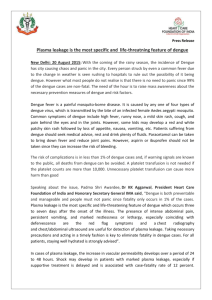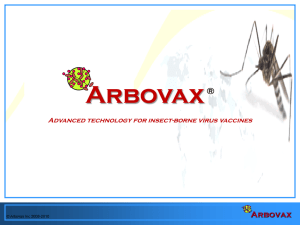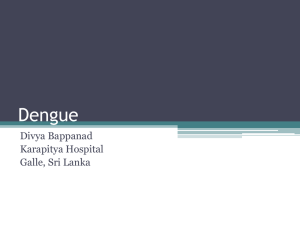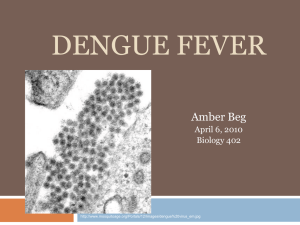Can do more harm than good and transfusion is only needed in
advertisement
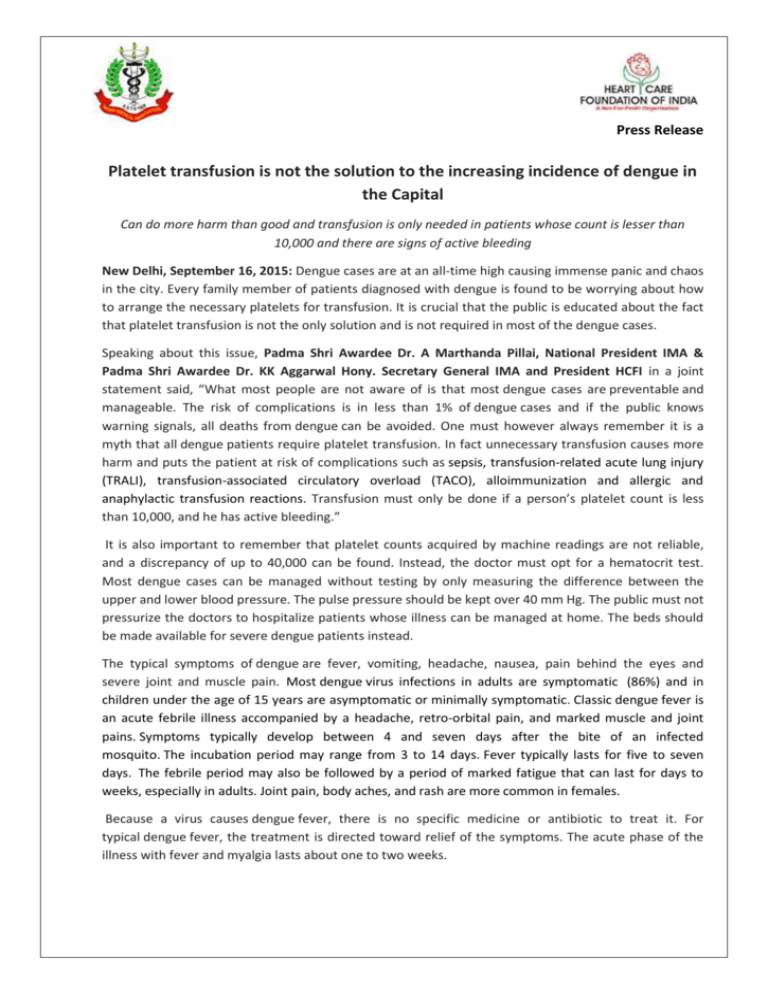
Press Release Platelet transfusion is not the solution to the increasing incidence of dengue in the Capital Can do more harm than good and transfusion is only needed in patients whose count is lesser than 10,000 and there are signs of active bleeding New Delhi, September 16, 2015: Dengue cases are at an all-time high causing immense panic and chaos in the city. Every family member of patients diagnosed with dengue is found to be worrying about how to arrange the necessary platelets for transfusion. It is crucial that the public is educated about the fact that platelet transfusion is not the only solution and is not required in most of the dengue cases. Speaking about this issue, Padma Shri Awardee Dr. A Marthanda Pillai, National President IMA & Padma Shri Awardee Dr. KK Aggarwal Hony. Secretary General IMA and President HCFI in a joint statement said, “What most people are not aware of is that most dengue cases are preventable and manageable. The risk of complications is in less than 1% of dengue cases and if the public knows warning signals, all deaths from dengue can be avoided. One must however always remember it is a myth that all dengue patients require platelet transfusion. In fact unnecessary transfusion causes more harm and puts the patient at risk of complications such as sepsis, transfusion-related acute lung injury (TRALI), transfusion-associated circulatory overload (TACO), alloimmunization and allergic and anaphylactic transfusion reactions. Transfusion must only be done if a person’s platelet count is less than 10,000, and he has active bleeding.” It is also important to remember that platelet counts acquired by machine readings are not reliable, and a discrepancy of up to 40,000 can be found. Instead, the doctor must opt for a hematocrit test. Most dengue cases can be managed without testing by only measuring the difference between the upper and lower blood pressure. The pulse pressure should be kept over 40 mm Hg. The public must not pressurize the doctors to hospitalize patients whose illness can be managed at home. The beds should be made available for severe dengue patients instead. The typical symptoms of dengue are fever, vomiting, headache, nausea, pain behind the eyes and severe joint and muscle pain. Most dengue virus infections in adults are symptomatic (86%) and in children under the age of 15 years are asymptomatic or minimally symptomatic. Classic dengue fever is an acute febrile illness accompanied by a headache, retro-orbital pain, and marked muscle and joint pains. Symptoms typically develop between 4 and seven days after the bite of an infected mosquito. The incubation period may range from 3 to 14 days. Fever typically lasts for five to seven days. The febrile period may also be followed by a period of marked fatigue that can last for days to weeks, especially in adults. Joint pain, body aches, and rash are more common in females. Because a virus causes dengue fever, there is no specific medicine or antibiotic to treat it. For typical dengue fever, the treatment is directed toward relief of the symptoms. The acute phase of the illness with fever and myalgia lasts about one to two weeks. In dengue, most complications occur within two days of the fever subsiding and most people are casual during this period. A doctor should attend to any abdominal pain, giddiness or weakness after the fever has subsided. Dengue complications during this period are due to a shift of blood volume and patients require a rapid infusion of oral or intravenous fluids in large quantities during this time. If a person has suffered from dengue in the past year, they must take additional precautions to prevent the disease because a second attack of dengue may be more dangerous than the first attack. There are four different types of dengue, and one can, therefore, suffer from dengue four times in his or her lifetime. The second or subsequent dengue infections tend to be more serious. A person with dengue can also simultaneously suffer from malaria. Malaria and dengue together can lower platelet counts to a dangerous level leading to complications. It is always said that prevention is better than cure, and it applies to the case of dengue as well. What most people must remember while taking necessary precautions is that dengue mosquitos only bite during the day and breed in clean, fresh water. Often people remain unaware of these facts and protect themselves from bites during the nights by using mosquito nets and repellent creams. They also feel that they are the safest when in clean urban environments, not realizing that mosquitos could be breeding in the clean water filled bucket kept in their backyard. - Ends About IMA: Indian Medical Association is the only representative, national voluntary organization of Doctors of Modern Scientific System of Medicine, which looks after the interest of doctors as well as the well being of the community at large. It has its Headquarter in Delhi and State / Terr. Branches in 29 States and Union Territories. It has over 2, 53,000 doctors as its members through more than 1650 active local branches spread across the country. For further information please contact: Rakhi - 9871109555 Sanjeev Khanna - 9871079105 Md Adib Ahmad – 9873716235 hsgima@gmail.com IMA Public & Media Advocacy Cell
